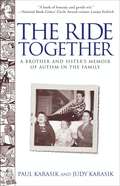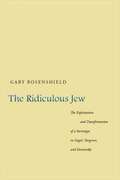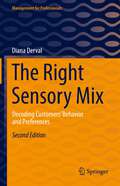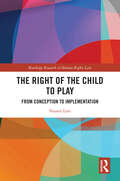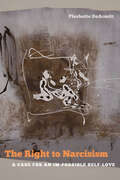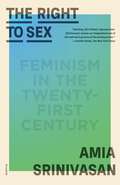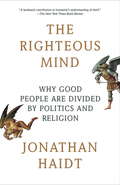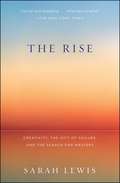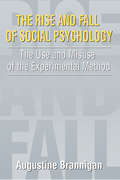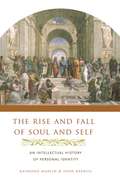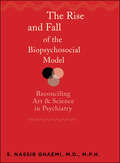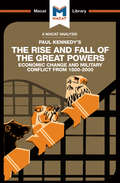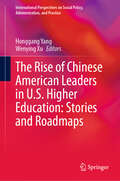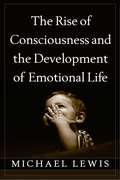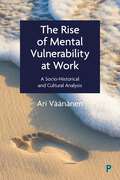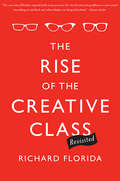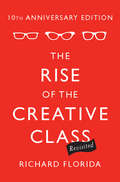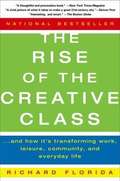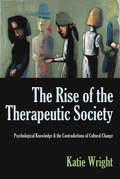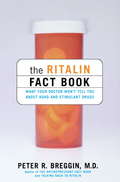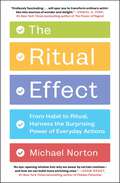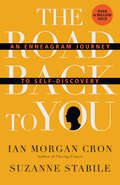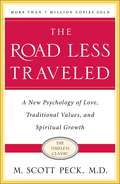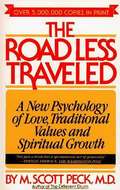- Table View
- List View
The Ride Together
by Judy Karasik Paul KarasikA Brother and Sister’s Memoir of Autism in the Family
The Ridiculous Jew
by Gary RosenshieldThis book is a study devoted to exploring the use of a Russian version of the Jewish stereotype (the ridiculous Jew) in the works of three of the greatest writers of the nineteenth century. Rosenshield does not attempt to expose the stereotype-which was self-consciously and unashamedly employed. Rather, he examines how stereotypes are used to further the very different artistic, cultural, and ideological agendas of each writer. What distinguishes this book from others is that it explores the problems that arise when an ethnic stereotype is so fully incorporated into a work of art that it takes on a life of its own, often undermining the intentions of its author as well as many of the defining elements of the stereotype itself. With each these writers, the Jewish stereotype precipitates a literary transformation, taking their work into an uncomfortable space for the author and a challenging one for readers.
The Right Sensory Mix: Decoding Customers’ Behavior and Preferences (Management for Professionals)
by Diana DervalMany companies fail to acknowledge and analyze disparities observed among customers and simply put them down to culture or emotion. New neuroendocrinological research proves that people are rational: They just have a different biological perception of the same stimulus. Their preferences, behavior, and decisions are strongly influenced by the hundreds of millions of sensors monitoring their body and brain. People with more taste buds are, for example, sensitive to bitterness and are more likely to drink their coffee with sugar or milk, or to drink tea. This book helps product managers, marketers, and corporate decision-makers understand and predict customers’ behavior and preferences. It provides the tools to design the right sensory mix (color, shape, depth, taste, smell, texture, and sound) for each product, and fine-tune their positioning and range for every local market. Using cases from different sectors, the author shows that this approach delivers planet and people-friendly innovations which have a higher chance of success in the market.
The Right of the Child to Play: From Conception to Implementation (Routledge Research in Human Rights Law)
by Naomi LottThis book provides a vital and original investigation into, and critique of, the situation facing the realisation of the child’s right to play. The right to play has been referred to as a forgotten right – forgotten by States implementing the Convention on the Rights of the Child, by the Committee on the Rights of the Child in monitoring and providing guidance on the Convention, and by human rights academics. Through multidisciplinary, original archival, novel doctrinal and primary empirical research, the work provides a thorough investigation of the right to play. It offers an innovative insight into its value, the challenges facing the realisation of the right, its raison d’être and its scope, content and obligations. It also critiques the Committee’s engagement with the right to play and shares lived experiences of efforts to support its implementation in the United Kingdom and Tanzania. The book highlights elements of best practice, challenges, and weaknesses, and makes recommendations for the continued and improved realisation of the right to play. The book will be a valuable resource for researchers, academics, advocates and policy-makers working in the areas of Children’s Rights, International Human Rights Law, Public International Law, Child Welfare, and Education.
The Right to Narcissism: A Case for an Im-possible Self-love
by Pleshette DeArmittThis book aims to wrest the concept of narcissism from its common and pejorative meanings— egoism and vanity—by revealing its complexity and importance. DeArmitt undertakes the work of rehabilitating “narcissism” by patiently reexamining the terms and figures that have been associated with it, especially in the writings of Rousseau, Kristeva, and Derrida.These thinkers are known for incisively exposing a certain (traditional) narcissism that has been operative in Western thought and culture and for revealing the violence it has wrought— from the dangers of amour-propre and the pathology of a collective “one’s own” to the phantasm of the sovereign One. Nonetheless, each of these thinkers denounces the naive denunciation of “narcissism,” as the dangers of a non-negotiation with narcissism are more perilous. By rethinking “narcissism” as a complex structure of self-relation through the Other, the book reveals the necessity of an im-possible self-love.
The Right to Sex: Feminism in the Twenty-First Century
by Amia Srinivasan“Laser-cut writing and a stunning intellect. If only every writer made this much beautiful sense.”—Lisa Taddeo, author of Three Women“Amia Srinivasan is an unparalleled and extraordinary writer—no one X-rays an argument, a desire, a contradiction, a defense mechanism quite like her. In stripping the new politics of sex and power down to its fundamental and sometimes clashing principles, The Right to Sex is a bracing revivification of a crucial lineage in feminist writing: Srinivasan is daring, compassionate, and in relentless search of a new frame.”—Jia Tolentino, author of Trick Mirror: Reflections on Self DelusionThrilling, sharp, and deeply humane, philosopher Amia Srinivasan's The Right to Sex: Feminism in the Twenty-First Century upends the way we discuss—or avoid discussing—the problems and politics of sex.How should we think about sex? It is a thing we have and also a thing we do; a supposedly private act laden with public meaning; a personal preference shaped by outside forces; a place where pleasure and ethics can pull wildly apart.How should we talk about sex? Since #MeToo many have fixed on consent as the key framework for achieving sexual justice. Yet consent is a blunt tool. To grasp sex in all its complexity—its deep ambivalences, its relationship to gender, class, race and power—we need to move beyond yes and no, wanted and unwanted.We do not know the future of sex—but perhaps we could imagine it. Amia Srinivasan’s stunning debut helps us do just that. She traces the meaning of sex in our world, animated by the hope of a different world. She reaches back into an older feminist tradition that was unafraid to think of sex as a political phenomenon. She discusses a range of fraught relationships—between discrimination and preference, pornography and freedom, rape and racial injustice, punishment and accountability, students and teachers, pleasure and power, capitalism and liberation.The Right to Sex: Feminism in the Twenty-First Century is a provocation and a promise, transforming many of our most urgent political debates and asking what it might mean to be free.
The Righteous Mind: Why Good People Are Divided by Politics and Religion
by Jonathan HaidtWhy can't our political leaders work together as threats loom and problems mount? Why do people so readily assume the worst about the motives of their fellow citizens? In The Righteous Mind, social psychologist Jonathan Haidt explores the origins of our divisions and points the way forward to mutual understanding. His starting point is moral intuition--the nearly instantaneous perceptions we all have about other people and the things they do. These intuitions feel like self-evident truths, making us righteously certain that those who see things differently are wrong. Haidt shows us how these intuitions differ across cultures, including the cultures of the political left and right. He blends his own research findings with those of anthropologists, historians, and other psychologists to draw a map of the moral domain, and he explains why conservatives can navigate that map more skillfully than can liberals. He then examines the origins of morality, overturning the view that evolution made us fundamentally selfish creatures. But rather than arguing that we are innately altruistic, he makes a more subtle claim--that we are fundamentally groupish. It is our groupishness, he explains, that leads to our greatest joys, our religious divisions, and our political affiliations. In a stunning final chapter on ideology and civility, Haidt shows what each side is right about, and why we need the insights of liberals, conservatives, and libertarians to flourish as a nation.
The Rise
by Sarah LewisIt is one of the enduring enigmas of the human experience: many of our most iconic, creative endeavors--from Nobel Prize-winning discoveries to entrepreneurial inventions and works in the arts--are not achievements but conversions, corrections after failed attempts. The gift of failure is a riddle. Like the number zero, it will always be both a void and the start of infinite possibility. The Rise--a soulful celebration of the determination and courage of the human spirit--makes the case that many of our greatest triumphs come from understanding the importance of this mystery. This exquisite biography of an idea is about the improbable foundations of creative human endeavor. The Rise begins with narratives about figures past and present who range from writers to entrepreneurs; Frederick Douglass, Samuel F. B. Morse, and J. K. Rowling, for example, feature alongside choreographer Paul Taylor, Nobel Prize-winning physicists Andre Geim and Konstantin Novoselov, Arctic explorer Ben Saunders, and psychology professor Angela Duckworth. The Rise explores the inestimable value of often ignored ideas--the power of surrender for fortitude, the criticality of play for innovation, the propulsion of the near win on the road to mastery, and the importance of grit and creative practice. From an uncommonly insightful writer, The Rise is a true masterwork.
The Rise and Fall of Comradeship: Hitler's Soldiers, Male Bonding and Mass Violence in the Twentieth Century
by Thomas KühneThis is an innovative account of how the concept of comradeship shaped the actions, emotions and ideas of ordinary German soldiers across the two world wars and during the Holocaust. Using individual soldiers' diaries, personal letters and memoirs, Kühne reveals the ways in which soldiers' longing for community, and the practice of male bonding and togetherness, sustained the Third Reich's pursuit of war and genocide. Comradeship fuelled the soldiers' fighting morale. It also propelled these soldiers forward into war crimes and acts of mass murders. Yet, by practising comradeship, the soldiers could maintain the myth that they were morally sacrosanct. Post-1945, the notion of kameradschaft as the epitome of humane and egalitarian solidarity allowed Hitler's soldiers to join the euphoria for peace and democracy in the Federal Republic, finally shaping popular memories of the war through the end of the twentieth century. Offers a cultural approach to military history, demonstrating the way in which ordinary soldiers thought, felt, made choices and coped with mass death and violence. Explores the multifaceted fabric of male bonding and how 'hard' and 'soft' features work together. Explains some of the discontinuities in Germany's twentieth century and how those engaged in brutal genocidal violence could then form one of the strongest democracies ever to be established.
The Rise and Fall of Social Psychology: An Iconoclast's Guide to the Use and Misuse of the Experimental Method (Social Problems And Social Issues Ser.)
by Augustine BranniganThis unflinching effort critically traces the attempt of social psychology over the past half century to forge a scientific understanding of human behavior based on the systematic use of experiments.Having examined the record from the inception of the field to the present, Brannigan suggests that it has failed to live up to its promise: that social psychologists have achieved little consensus about the central problems in the field; that they have failed to amass a body of systematic, non-trivial theoretical insight; and that recent concerns over the ethical treatment of human subjects could arguably bring the discipline to closure. But that is not the disastrous outcome that Brannigan hopes for. Rather, going beyond an apparent iconoclasm, the author explores prospects for a post-experimental discipline. It is a view that admits the role of ethical considerations as part of scientific judgment, but not as a sacrifice of, but an extension of, empirical research that takes seriously how the brain represents information, and how these mechanisms explain social behaviors and channel human choices and appetites.What makes this work special is its function as a primary text in the history as well as the current status of social psychology as a field of behavioral science. The keen insight, touched by the gently critical styles, of such major figures as Philip Zimbardo, Morton Hunt, Leon Festinger, Stanley Milgram, Alex Crey, Samuel Wineburg, Carol Gilligan, David M. Buss--among others--makes this a perfect volume for students entering the field, and no less, a reminder of the past as well as present of social psychology for its serious practitioners.
The Rise and Fall of Soul and Self: An Intellectual History of Personal Identity
by John Barresi Raymond MartinThis book traces the development of theories of the self and personal identity from the ancient Greeks to the present day. From Plato and Aristotle to Freud and Foucault, Raymond Martin and John Barresi explore the works of a wide range of thinkers and reveal the larger intellectual trends, controversies, and ideas that have revolutionized the way we think about ourselves.The authors open with ancient Greece, where the ideas of Plato, Aristotle, and the materialistic atomists laid the groundwork for future theories. They then discuss the ideas of the church fathers and medieval and Renaissance philosophers, including St. Paul, Philo, Augustine, Aquinas, and Montaigne. In their coverage of the emergence of a new mechanistic conception of nature in the seventeenth century, Martin and Barresi note a shift away from religious and purely philosophical notions of self and personal identity to more scientific and social conceptions, a trend that has continued to the present day. They explore modern philosophy and psychology, including the origins of different traditions within each discipline, and explain both the theoretical relevance of feminism and gender and ethnic studies and also the ways that Derrida and other recent thinkers have challenged the very idea that a unified self or personal identity even exists. Martin and Barresi cover a number of issues broached by philosophers and psychologists, such as the existence of a fixed and unchanging self and whether the concept of the soul has a use outside of religious contexts. They address the question of whether notions of the soul and the self are still viable in today's world. Together, they reveal the fascinating ways in which great thinkers have grappled with these and other questions and the astounding impact their ideas have had on the development of self-understanding in the west.
The Rise and Fall of the Biopsychosocial Model: Reconciling Art and Science in Psychiatry
by S. Nassir Ghaemi2010 Outstanding Academic Title, Choice MagazineThis is the first book-length historical critique of psychiatry’s mainstream ideology, the biopsychosocial (BPS) model. Developed in the twentieth century as an outgrowth of psychosomatic medicine, the biopsychosocial model is seen as an antidote to the constraints of the medical model of psychiatry. Nassir Ghaemi details the origins and evolution of the BPS model and explains how, where, and why it fails to live up to its promises. He analyzes the works of its founders, George Engel and Roy Grinker Sr., traces its rise in acceptance, and discusses its relation to the thought of William Osler and Karl Jaspers. In assessing the biopsychosocial model, Ghaemi provides a philosophically grounded evaluation of the concept of mental illness and the relation between evidence-based medicine and psychiatry. He argues that psychiatry's conceptual core is eclecticism, which in the face of too much freedom paradoxically leads many of its adherents to enact their own dogmas. Throughout, he makes the case for a new paradigm of medical humanism and method-based psychiatry that is consistent with modern science while incorporating humanistic aspects of the art of medicine.Ghaemi shows how the historical role of the BPS model as a reaction to biomedical reductionism is coming to an end and urges colleagues in the field to embrace other, less-eclectic perspectives.
The Rise and Fall of the Great Powers: Economic Change and Military Conflict From 1500-2000
by Riley QuinnPaul Kennedy owes a great deal to the editor who persuaded him to add a final chapter to this study of the factors that contributed to the rise and fall of European powers since the age of Spain’s Philip II. This tailpiece indulged in what was, for an historian, a most unusual activity: it looked into the future. Pondering whether the United States would ultimately suffer the same decline as every imperium that preceded it, it was this chapter that made The Rise and Fall of the Great Powers a dinner party talking point in Washington government circles. In so doing, it elevated Kennedy to the ranks of public intellectuals whose opinions were canvassed on matters of state policy. From a strictly academic point of view, the virtues of Kennedy's work lie elsewhere, and specifically in his flair for asking the sort of productive questions that characterize a great problem-solver. Kennedy's work is an example of an increasingly rare genre – a work of comparative history that transcends the narrow confines of state– and era–specific studies to identify the common factors that underpin the successes and failures of highly disparate states. Kennedy's prime contribution is the now-famous concept of ‘imperial overstretch,’ the idea that empires fall largely because the military commitments they acquire during the period of their rise ultimately become too much to sustain once they lose the economic competitive edge that had projected them to dominance in the first place. Earlier historians may have glimpsed this central truth, and even applied it in studies of specific polities, but it took a problem-solver of Kennedy's ability to extend the analysis convincingly across half a millennium.
The Rise of Chinese American Leaders in U.S. Higher Education: Stories and Roadmaps (International Perspectives on Social Policy, Administration, and Practice)
by Wenying Xu Honggang YangThis book is a collection of stories and reflections that represent Chinese American leaders and depict their tortuous journeys in U.S. higher education that comes at a critical point in time. Many books have been devoted to academic leadership, but this volume uniquely focuses on subjects most relevant to Chinese Americans. We live at a time that not only witnesses an increase in Chinese American leaders on U.S. campuses but also mounting incidents of discriminatory treatment of this group. This book showcases 36 stories and reflections from past, present, and future leaders, including the five previously published stories. They represent leaders holding different ideological values in various academic fields, positions, stages of careers, professional trajectories, generations, Chinese ethnic groups, and geographical locations. The Rise of Chinese American Leaders in U.S. Higher Education makes a valuable contribution to the body of literature that has assisted countless academic leaders in navigating their careers, bringing to the forefront a distinct group of academic leaders who have been underrepresented.
The Rise of Consciousness and the Development of Emotional Life
by Michael LewisSynthesizing decades of influential research and theory, Michael Lewis demonstrates the centrality of consciousness for emotional development. At first, infants' competencies constitute innate reactions to particular physical events in the child's world. These "action patterns" are not learned, but are readily influenced by temperament and social interactions. With the rise of consciousness, these early competencies become reflected feelings, giving rise to the self-conscious emotions of empathy, envy, and embarrassment, and, later, shame, guilt, and pride. Focusing on typically developing children, Lewis also explores problems of atypical emotional development.
The Rise of Mental Vulnerability at Work: A Socio-Historical and Cultural Analysis
by Ari VäänänenSince the 1960s, a major mental health crisis has emerged among Western working populations. By analysing the development of various occupational cultures and using extensive data sources, this book captures the history of mental vulnerability in working life. Through a study spanning several decades, the book develops a new understanding of how mental vulnerability has evolved through changes to our working lives and socio-cultural being. It shows how our current knowledge about work, disability and the psyche is influenced by our time and provides intertwining conceptual frameworks and alternatives to current canonised knowledge about mental health in working life.
The Rise of the Creative Class, Revisited
by Richard FloridaInitially published in 2002, The Rise of the Creative Class quickly achieved classic status for its identification of forces then only beginning to reshape our economy, geography, and workplace. Weaving story-telling with original research, Richard Florida identified a fundamental shift linking a host of seemingly unrelated changes in American society: the growing importance of creativity in people’s work lives and the emergence of a class of people unified by their engagement in creative work. Millions of us were beginning to work and live much as creative types like artists and scientists always had, Florida observed, and this Creative Class was determining how the workplace was organized, what companies would prosper or go bankrupt, and even which cities would thrive. In The Rise of the Creative Class Revisited, Florida further refines his occupational, demographic, psychological, and economic profile of the Creative Class, incorporates a decade of research, and adds five new chapters covering the global effects of the Creative Class and exploring the factors that shape "quality of place” in our changing cities and suburbs.
The Rise of the Creative Class--Revisited
by Richard FloridaThe Washington Monthly 2002 Annual Political Book Award WinnerThe Rise of the Creative Class gives us a provocative new way to think about why we live as we do today-and where we might be headed. Weaving storytelling with masses of new and updated research, Richard Florida traces the fundamental theme that runs through a host of seemingly unrelated changes in American society: the growing role of creativity in our economy. Just as William Whyte's 1956 classic The Organization Man showed how the organizational ethos of that age permeated every aspect of life, Florida describes a society in which the creative ethos is increasingly dominant. Millions of us are beginning to work and live much as creative types like artists and scientists always have-with the result that our values and tastes, our personal relationships, our choices of where to live, and even our sense and use of time are changing. Leading the shift are the nearly 38 million Americans in many diverse fields who create for a living-the Creative Class. The Rise of the Creative Class chronicles the ongoing sea of change in people's choices and attitudes, and shows not only what's happening but also how it stems from a fundamental economic change. The Creative Class now comprises more than thirty percent of the entire workforce. Their choices have already had a huge economic impact. In the future they will determine how the workplace is organized, what companies will prosper or go bankrupt, and even which cities will thrive or wither.
The Rise of the Creative Class: And How It's Transforming Work, Leisure, Community and Everyday Life
by Richard L. FloridaThe Rise of the Creative Class gives a provocative way to think about why people live as they do today and where they might be headed. Weaving storytelling with masses of new and updated research, Florida traces the role of creativity in the economy.
The Rise of the Therapeutic Society: Psychological Knowledge & the Contradictions of Cultural Change
by Katie WrightAn examination of the Western world’s contemporary fascination with psychological life, and the historical developments that fostered it. In this book, sociologist Katie Wright traces the ascendancy of therapeutic culture, from nineteenth-century concerns about nervousness, to the growth of psychology, the diffusion of an analytic attitude, and the spread of therapy and counseling, using Australia as a focal point. Wright’s analysis, which draws on social theory, cultural history, and interviews with therapists and people in therapy, calls into question the pessimism that pervades many accounts of the therapeutic turn and provides an alternative assessment of its ramifications for social, political, and personal life in the globalized West.Special Commendation, TASA Raewyn Connell Prize
The Ritalin Fact Book: What Your Doctor Won't Tell You About ADHD and Stimulant Drugs
by Peter R. BregginKnown as the "Ralph Nader of psychiatry," Peter Breggin has been the medical expert in countless civil and criminal cases involving the use or misuse of psychoactive medications. This unusual position has given him unprecedented access to private pharmaceutical research and correspondence files, access that informs this straight-talking guide to the most-prescribed and controversial class of psychoactive medications prescribed for children. From how these drugs work in the brain to documented side and withdrawal effects, The Ritalin Fact Book is up-to-the-minute and easy-to-access. With its suggestions for non-prescriptive ways to treat ADD and ADHD, it is essential reading for every parent whose child is on or who has been recommended psychoactive medication.
The Ritual Effect: From Habit to Ritual, Harness the Surprising Power of Everyday Actions
by Dr Michael NortonIn the bestselling tradition of Charles Duhigg&’s The Power of Habit and Angela Duckworth&’s Grit, a renowned social psychologist demonstrates how a subtle turning of habits into rituals can &“clear a little space for everyday magic&” (The Guardian) in our lives.Our lives are filled with repetitive tasks meant to keep us on track—what we come to know as habits. Over time, these routines (like brushing your teeth or putting on your right sock first) tend to be performed automatically. But when we&’re more mindful about these actions—when we focus on the precise way they are performed—they can instead become rituals. Shifting from a &“habitual&” mindset to a &“ritual&” mindset can convert ordinary acts from black and white to technicolor. Think about the way you savor a certain beverage, the care you take with a particular outfit that gets worn only on special occasions, the unique way that your family gathers around the table during holidays, or the secret language you enjoy with your significant other. To some, these behaviors may seem quirky, but because rituals matter so deeply to us on a personal level, they give our lives purpose and meaning. Drawing on a decade of original research, Norton shows that rituals play a role in healing communities experiencing a great loss, marking life&’s major transitions, driving a stadium of sports fans to ecstasy, and helping us rise to challenges and realize opportunities. Compelling, insightful, and practical, The Ritual Effect reminds us of the intention-filled acts that drive human behavior and create surprising satisfaction and enjoyment.
The Road Back to You: An Enneagram Journey to Self-Discovery
by Suzanne Stabile Ian CronIgnorance is bliss―except in self-awareness. What you don't know about yourself can hurt you and your relationships―and even keep you in the shallows with God. Do you want help figuring out who you are and why you're stuck in the same ruts? The Enneagram is an ancient personality typing system with an uncanny accuracy in describing how human beings are wired, both positively and negatively. In The Road Back to You Ian Morgan Cron and Suzanne Stabile forge a unique approach―a practical, comprehensive way of accessing Enneagram wisdom and exploring its connections with Christian spirituality for a deeper knowledge of ourselves, compassion for others, and love for God. Witty and filled with stories, this book allows you to peek inside each of the nine Enneagram types, keeping you turning the pages long after you have read the chapter about your own number. Not only will you learn more about yourself, but you will also start to see the world through other people's eyes, understanding how and why people think, feel, and act the way they do. Beginning with changes you can start making today, the wisdom of the Enneagram can help take you further along into who you really are―leading you into places of spiritual discovery you would never have found on your own, and paving the way to the wiser, more compassionate person you want to become.
The Road Less Traveled: A New Psychology of Love, Traditional Values and Spiritual Growth
by M. Scott PeckPerhaps no book in this generation has had a more profound impact on our intellectual and spiritual lives than The Road Less Traveled. With sales of more than seven million copies in the United States and Canada, and translations into more than twenty-three languages, it has made publishing history, with more than ten years on the New York Times bestseller list. Now, with a new Introduction by the author, written especially for this twenty-fifth anniversary deluxe trade paperback edition of the all-time national bestseller in its field, M. Scott Peck explains the ideas that shaped this book and that continue to influence an ever-growing audience of readers. Written in a voice that is timeless in its message of understanding, The Road Less Traveled continues to help us explore the very nature of loving relationships and leads us toward a new serenity and fullness of life. It helps us learn how to distinguish dependency from love; how to become a more sensitive parent; and ultimately how to become one's own true self. Recognizing that, as in the famous opening line of his book, "Life is difficult" and that the journey to spiritual growth is a long one, Dr. Peck never bullies his readers, but rather guides them gently through the hard and often painful process of change toward a higher level of self-understanding.
The Road Less Traveled: A New Psychology of Love, Traditional Values, and Spiritual Growth
by M. Scott PeckWays in which confronting and resolving our problems, and suffering through the changes, can enable us to reach a higher level of self-understanding.
